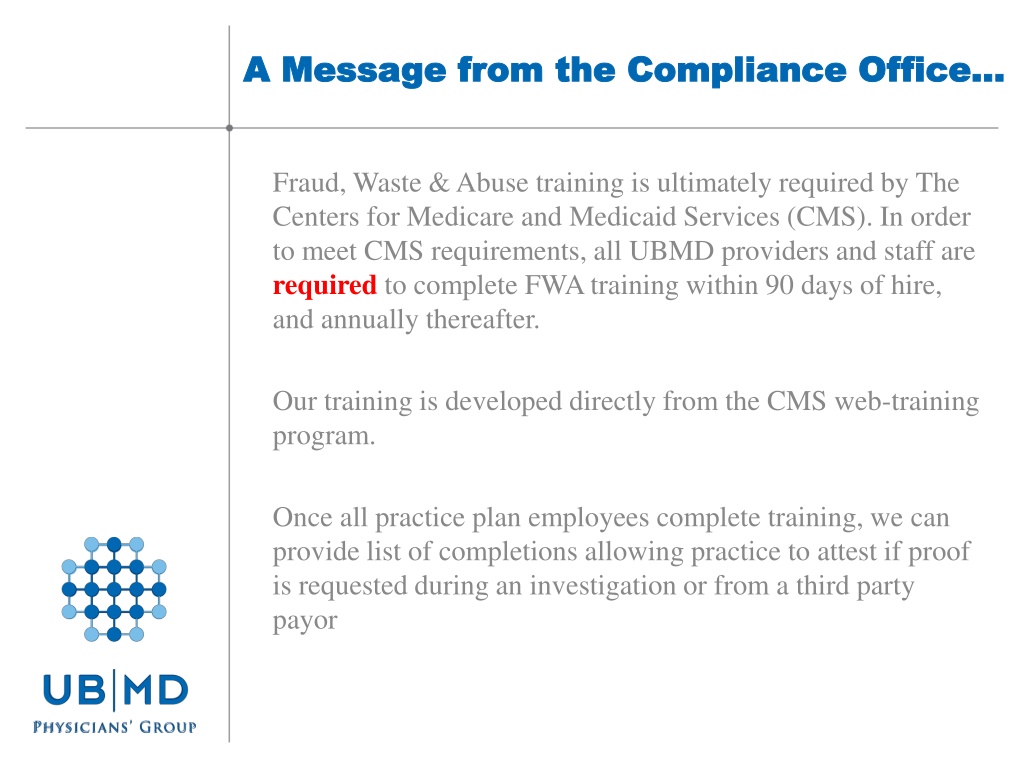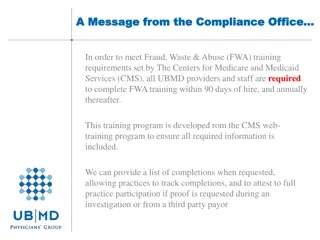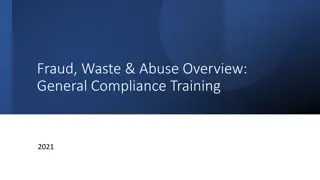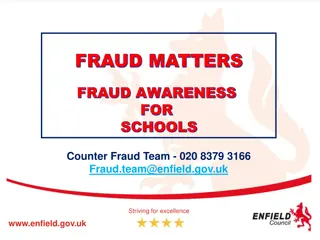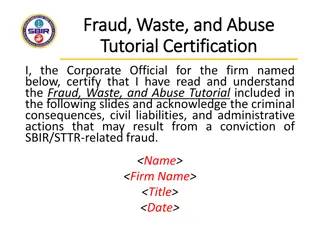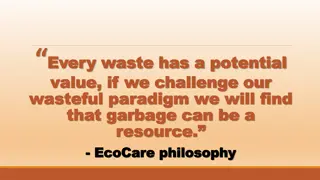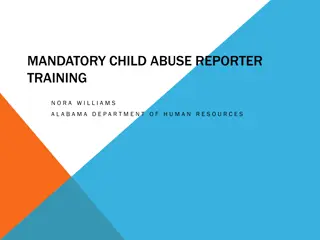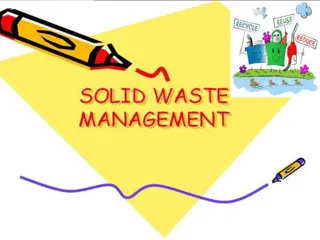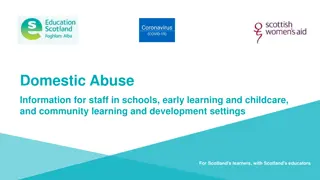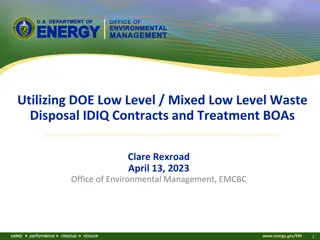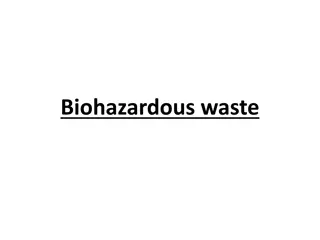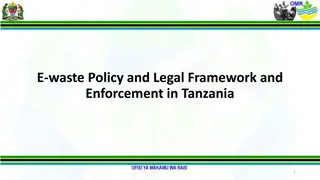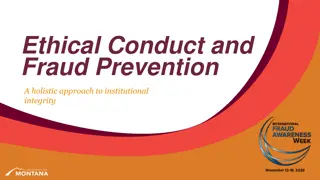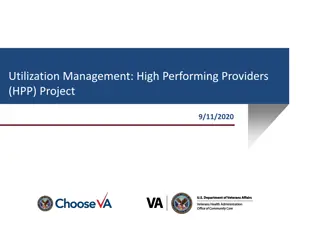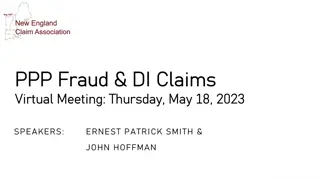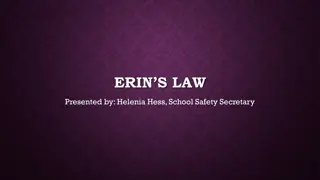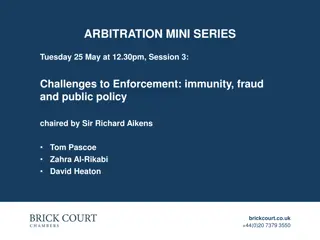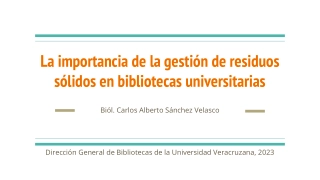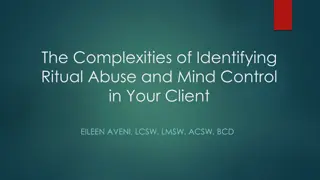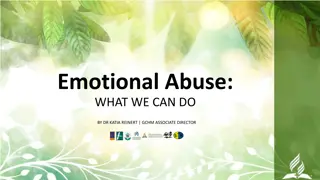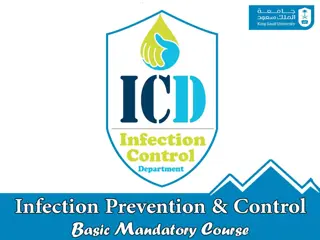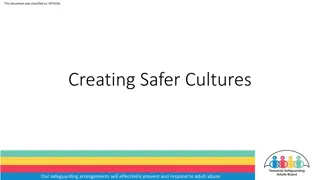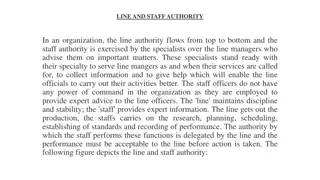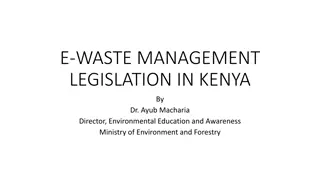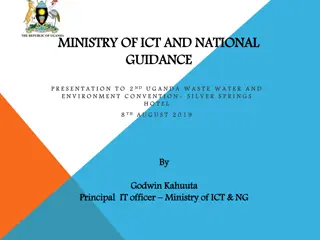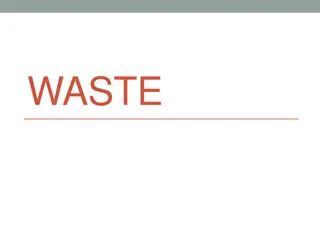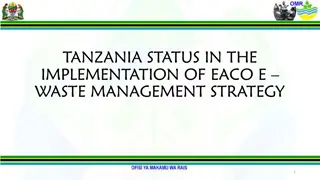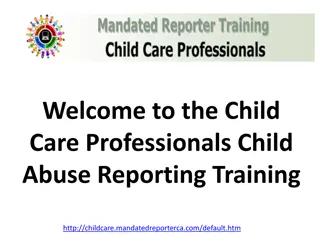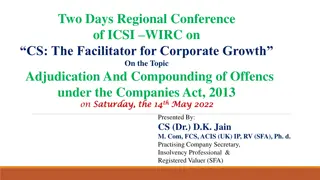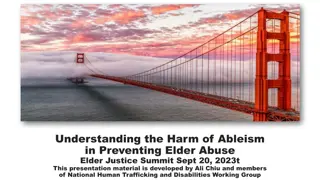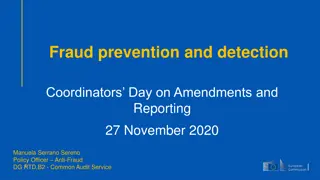Understanding Fraud, Waste, and Abuse Training Requirements for UBMD Providers and Staff
Compliance office message emphasizing the mandatory Fraud, Waste, and Abuse (FWA) training for UBMD providers and staff as required by CMS. The training aims to educate on recognizing, preventing, and reporting FWA to combat improper spending in healthcare. Details on FWA definitions, differences, and the importance of training are provided in the message.
Download Presentation

Please find below an Image/Link to download the presentation.
The content on the website is provided AS IS for your information and personal use only. It may not be sold, licensed, or shared on other websites without obtaining consent from the author. Download presentation by click this link. If you encounter any issues during the download, it is possible that the publisher has removed the file from their server.
E N D
Presentation Transcript
A A Message from the Compliance Office Message from the Compliance Office Fraud, Waste & Abuse training is ultimately required by The Centers for Medicare and Medicaid Services (CMS). In order to meet CMS requirements, all UBMD providers and staff are required to complete FWA training within 90 days of hire, and annually thereafter. Our training is developed directly from the CMS web-training program. Once all practice plan employees complete training, we can provide list of completions allowing practice to attest if proof is requested during an investigation or from a third party payor
Training Requirements Once training is completed, you should be able to correctly: Recognize & distinguish Fraud, Waste & Abuse; Recognize major laws & regulations pertaining to FWA; Understand potential consequences & penalties for violations; Identify & apply methods of preventing FWA; Report FWA; and Determine how to correct FWA.
Why do we need FWA training? Billions of dollars are improperly spent every year due to fraud, waste & abuse. As healthcare workers and UBMD employees, whether provider or administrative, we are ALL responsible for combatting fraud, waste & abuse. To understand that every action we take potentially affects the Medicare program. To learn how to detect, correct and prevent FWA. To be part of the solution.
What is FWA? Fraud Knowingly & willfully executing, or attempting to execute a scheme to defraud any health care benefit program; Obtain by means of false or fraudulent pretenses, representations, promises, money or property owned by any health care benefit program; Intentionally submitting false information to the government or government contractor to get money or a benefit. Waste Practices that, directly or indirectly, result in unnecessary costs to the Medicare Program, such as overusing services. Generally not considered to be caused by criminally negligent actions, but by the misuse of resources. Abuse Includes actions that may, directly or indirectly, result in unnecessary costs to the Medicare Program. Involves paying for items or services when there is no legal entitlement to that payment, and the provider has not knowingly and/or intentionally misrepresented the facts to obtain payment.
Difference Between Fraud, Waste & Abuse Fraud requires intent to obtain payment, and knowledge that the actions are wrong. Waste & Abuse may involve obtaining improper payment or creating unnecessary cost to Medicare Program, but do not require the same intent and knowledge. For the definitions of fraud, waste & abuse, refer to Chapter 21 Section 20 of the Medicare Managed Care Manual and Chapter 9 of the Prescription Drug Benefit Manual on the Centers for Medicare & Medicaid Services (CMS) website
Laws & Penalties False Claims Act: A person is liable for civil provisions if he or she knowingly: Conspires to violate the FCA; Carries out other acts to obtain property from the government by misrepresentation; Conceals or improperly avoids or decreases an obligation to pay the government; Makes or uses a false record or statement supporting a false claim; Presents a false claim for payment or approval. Damages & Penalties Three times the government s damages cause by violator, plus a penalty.
Laws & Penalties The Fraud Statute makes it a criminal offense to : Knowingly and willfully execute, or attempt to execute, a scheme to defraud a health care benefit program; Conviction does not require proof that the violator had knowledge of the law or specific intent to violate the law. Damages & Penalties Up to $250,000 fine or up to 10 years imprisonment, or both. Criminal Health Care Fraud Damages Persons who knowingly make a false claim may be subject to criminal fines of up to $250,000, imprisonment for up to 20 years, or both. If the violations result in death the individual may be imprisoned for any term of years or for life.
Laws & Penalties The Anti-Kickback Statute (AKS): Prohibits knowingly and willfully soliciting, receiving, offering or paying remuneration for referrals for services that are paid, in whole or in part, under a Federal health care program, including Medicare. Kickbacks, bribes or rebates. Safe harbors may apply. Damages & Penalties Up to $25,000 fine, imprisonment for up to 5 years, or both.
Laws & Penalties Civil Monetary Penalties Law (CMP) allows the OIG to impose civil monetary penalties for a number of reasons, including: Arranging for services or items from an excluded individual or entity; Providing services or items while provider is excluded; Failing to grant OIG timely access to records; Knowing of and failing to report and return an overpayment within 60 days of identification; Making false claims; or Paying to influence referrals. Damages & Penalties Around $15,000 to $70,000 depending on the specific violation. Also subject to 3 times the amount claimed for each service item, or of remuneration offered, paid, solicited or received.
Laws & Penalties The Stark Statute (Physician Self-Referral Law): Prohibits a physician from making referrals for certain designated health services (DHS) to an entity when the physician, or a member of his or her family, has an ownership/investment interest or a compensation arrangement. Exceptions may apply. Damages & Penalties A penalty of around $24,250 can be imposed for each service provided. May also be around a $161,000 fine for entering into an unlawful arrangement or scheme.
Laws & Penalties Mandatory Exclusions: OIG is required by law to exclude individuals & entities convicted of the following types of criminal offenses: Medicare or Medicaid fraud, and other offenses related to delivery of items or services under Medicare, Medicaid, SCHIP or other State health care programs; Patient abuse or neglect; Felony convictions for other health care-related fraud, theft or other financial misconduct; and Felony convictions relating to unlawful manufacture, distribution, prescription or dispensing of controlled substances.
Laws & Penalties Permissive Exclusions: OIG has discretion to exclude individuals and entities on a number of grounds, including but not limited to: Misdemeanor convictions related to health care fraud other than Medicare or a State health program, fraud in a program (other than a health care program) funded by any Federal, State or local government agency; Misdemeanor convictions relating to the unlawful manufacture, distribution, prescription or dispensing of controlled substances; Suspension, revocation or surrender of a license to provide health care for reasons bearing on professional competence, professional performance or financial integrity; Provision of unnecessary or substandard services; Submission of false or fraudulent claims to a Federal health care program; Engaging in unlawful kickback arrangements; Defaulting on health education loan or scholarship obligations; and Controlling a sanctioned entity as an owner, officer or managing employee.
Laws & Penalties Exclusion No Federal health care program payment may be made for any item or service furnished, ordered or prescribed by and individual or entity excluded by the OIG. OIG has authority to exclude individuals & entities from federally funded health care programs, and maintains the List of Excluded Individuals and Entities (LEIE). The U.S. General Services Administration (GSA) administers the Excluded Parties List system (EPLS), which contains debarment actions taken by various Federal agencies, including OIG. If looking for excluded individuals or entities make sure to check both LEID and EPLS monthly since the lists are not the same.
Laws & Penalties Health Insurance Portability & Accountability Act (HIPAA): Created greater access to health care insurance. Strengthened protection of privacy of health care data. Promoted standardization and efficiency in the health care industry. Deter unauthorized access to PHI. Anyone with access to PHI, must comply with HIPAA. Damages & Penalties Violations may result in Civil Monetary Penalties. In some cases, criminal penalties may apply. Can lead to action against a provider s license to practice medicine.
What are your responsibilities? You must comply with all applicable statutory, regulatory and other Medicare requirements, including adopting and using an effective compliance program. You have a duty to report any compliance concerns and suspected or actual violations of which you may be aware. You have a duty to follow the UBMD Compliance Plan (including the Code of Conduct), which articulates UBMD s commitment to standards of conduct and ethical rules of behavior.
What is a Whistleblower? A whistleblower is a person who exposes information or activity deemed illegal, dishonest or violate professional or clinical standards. Whistleblowers are protected from retaliation. Whistleblowers may receive at least 15% but not more than 30% of money collected in successful lawsuit.
How do you prevent FWA? Conduct yourself in an ethical manner at all times. Use accurate and timely data/billing. Comply with other payers rules. Verify all information provided to you. Be aware of suspicious activity. Keep up to date with FWA policies and procedures, standards of conduct, laws, regulations, CMS guidance and UBMD Compliance Office guidance. Read Compliance Quarterly newsletters and other communications sent to you from the UBMD Compliance Office as they contain important information and updates. Complete all compliance and HIPAA training as required. Know that reported issues will be addressed.
Reporting FWA Everyone must report known or suspected instances of FWA. Retaliation for reporting compliance concerns in good faith will not be tolerated, regardless of whether or not a violation is found as a result of the initial report. This, and the process for reporting is clearly stated in the UBMD Compliance Plan. Any concerns should be reported to your supervisor and/or the UBMD Compliance office. Even if you suspect something is wrong but aren t sure if it is FWA, report it. Call or email the Compliance Office directly. Utilize the Compliance Hotline (716.888.4752) or Compliance Issue Reporting Form if you wish to remain anonymous. All reported concerns will be investigated by the Chief Compliance Officer.
Reporting FWA When reporting suspected FWA, you should include: Contact information for the source of information, suspects & witnesses; Details of the alleged FWA; Identification of specific Medicare rules allegedly violated; and The suspect s history of compliance, education training and communication within UBMD and other entities. If warranted, potentially fraudulent conduct must be reported to government authorities such as OIG, DOJ or CMS. Individuals or entities who wish to voluntarily disclose self- discovered potential fraud to OIG may do so under Self- Disclosure Protocol (SDP). Self-disclosure gives providers the opportunity to avoid the costs and disruptions associated with a government directed investigation and civil or administrative litigation. The UBMD Chief Compliance Officer should ALWAYS be contacted first regarding cases of self-disclosure.
Correcting FWA Correcting the problem saves the government money, and ensures that you are in compliance with CMS requirements. Always consult the UBMD Chief Compliance Officer to find out the process for corrective action plan development, and develop a plan. Actual plan will vary, depending on the specific circumstances, but in general: Design the corrective action to correct the underlying problem that results in FWA program violations and prevents future non-compliance. Tailor the corrective action to address the particular FWA, problem, or deficiency identified. Include timeframe for specific actions. Document corrective actions addressing non-compliance or FWA committed by the employee, and include consequences for failure to satisfactorily complete the corrective action. Once started, continually monitor corrective actions to ensure they are effective.
Correcting FWA Corrective action may include: Adopting new prepayment edits or document review requirements; Conducting additional mandated training; Providing educational materials; Revising policies and/or procedures; Sending warning letters; Terminating an employee or provider; Any combination of the above.
For more information on False Claims Act: 31 United States Code (U.S.C.) Sections 3729-3733 Fraud Statute: 18 USC Sections 1346-1347 Anti-Kickback Statute: 42 USC Section 1320a-7b(b) Stark Statute (Physician Self-Referral Law): 42 USC Section 1395nn Civil Monetary Penalties: 42 USC 1320a-7a and the Act, Section 1128A(a) Exclusion: LEIE and EPLS and 42 USC Section 1320a-7 and 42 Code of Federal Regulations (CFR) Section 1001.1901 HIPAA: HIPAA Webpage
To Complete Your Training You are required to successfully complete a 5 question quiz based on this presentation. The questions appear on a separate Word document. Use the following link to input your answers. https://smbsweb.med.buffalo.edu/ubmd/training.aspx When you submit your answers, if all are correct, you will see a Success message on the screen. If not, the message will tell you which answers you need to go back and re-check. Training will be complete only when you receive the Success message.
Questions REMEMBER!!! Compliance & fraud prevention are everyone s responsibility - governing boards, management, providers, and staff. ________________________ If you have any questions regarding this training, please contact: Larry DiGiulio, Chief Compliance Officer larryd@buffalo.edu or Sue Marasi, CHC, CPCA Compliance Administrator smmarasi@buffalo.edu or Peter Rossow, CPC, CPMA Director of Audit & Education pvrossow@buffalo.edu ANONYMOUS COMPLIANCE HOTLINE 716-888-4752
